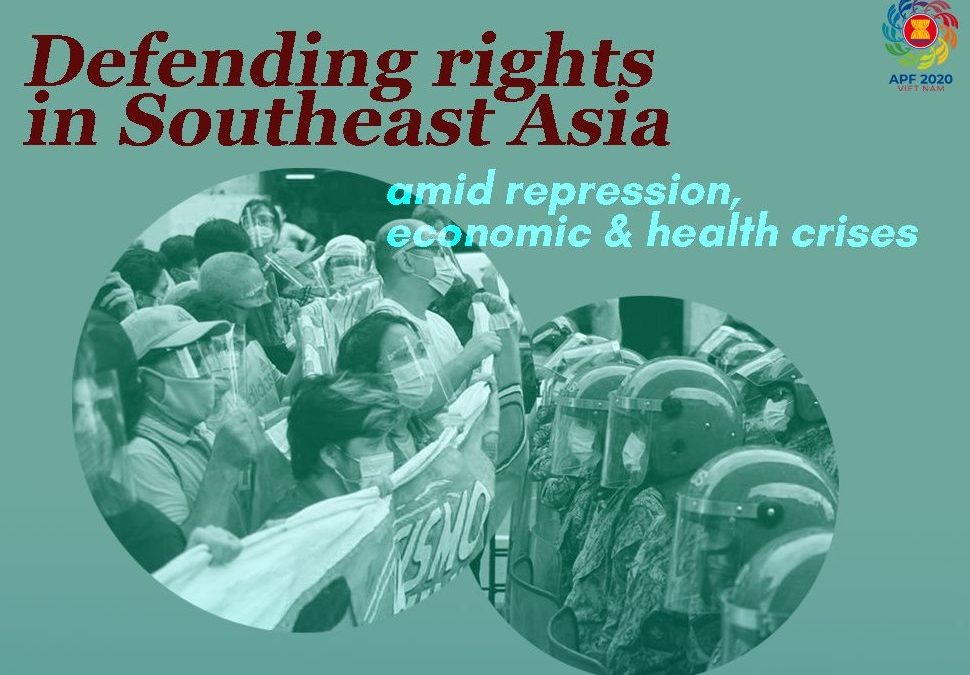On Economic Repression and Militarism
Delivered by Sarah Torres, Coordinator of Reality of Aid – Asia Pacific
The repression and crises we face today do not exist in a vacuum. These are largely the result of economic maneuvers of the powers that be, which means that whoever controls the economy also controls the politics and the culture of a society.
Now, economic control is largely focused on transnational corporations. Even authoritarian governments are at the mercy of the private sector. Such corporate greed co-opts our call to sustainable development as private sector intervention, with the aid of international finance institutions or IFIs as well as national governments in facilitating an enabling environment for the private sector, led to the so-called corporatization of development. And this is a crisis in itself.
When we say corporatization of development, we mean the prioritizing and extraction of profits at the expense of supposedly sustainable development for those communities to be affected. Corporations have essentially captured basic social services and infrastructure which the public sector should have readily provided to its constituents without the million-dollar price tag.
The corporatization or corporate capture of development is the “true self” of IFI and private sector investments in developing countries, such as our region.
Through one of our programs, the Reality of Aid – Asia Pacific CSO Aid Observatorio, a CSO-initiated and maintained database of ODA-funded and IFI-funded development projects, we fleshed out the usual impacts of corporate capture of development in terms of human rights, peace and security, environment, and democracy. These include:
- Forced displacement, eviction, and demolition
- Loss of livelihood
- No Free, Prior and Informed Consent
- Militarization of communities executed by military forces, the police, or private armies
- Pollution
- Hazardous waste/oil spills
- Loss of biodiversity
- Undermining sovereignty
- No or lack of consultations in affected communities
With the evidence we have from the Observatorio as well as from our publications, it is clear that profit, especially from infrastructure projects, is more important than the commitment to uphold human rights toward sustainable development. After all, the former is the vision of monopoly capitalism.
And yet, in the face of human rights violations, military interventions, undemocratic policies, and disregard for the environment, is the unwavering resistance of the people. We’ll hear more on this later from the rest of our panelists.
But let me focus on militarism as the key ingredient of transnational corporations and authoritarian governments, with the go signal of donor countries, to drive away people from their lands where “development” projects will be built, consequently enabling conflict and fragility.
Conflict is both a symptom and consequence of a political and economic landscape that does not put people at the center. Poverty and inequality, rising unemployment, inadequate social protection, underfunded healthcare system and education sector, and the violation of human rights, including that of women, Indigenous Peoples, and other marginalized groups are some of the drivers of conflict.
Authoritarian governments cause and further exploit weak and fragile democracies and exhaust their military powers against their own peoples in order to push for their own economic and political agenda, perpetuating this cycle of oppression and poverty in our region.
The Myanmar government, for instance, stripped the Rohingya peoples, who have lived for generations in the Rakhine State, of their right to life, of their freedom to move, and most recently, of their right to vote, among others.
But some donor countries are also culpable for corroborating with such regimes through militarization of aid and enactment of security policies that lead to military aggression in conflict areas. The United States remains the highest military spender among global powers, followed by China.
At the heart of the power struggle of the United States and China to dominate the world economically and politically, is militarization – the use of force, and in worst scenarios, the funding of wars, to subjugate developing nations.
Political repression comes next. It is not enough for US and China, for instance, to coerce people through arms. Rights defenders, lawyers, journalists, and community organizers are being jailed, if not killed. The Press is shut down. Advocates of social justice are red-tagged. Civil society organizations are hunted down, and their space to organize and dissent is shrinking.
On top of this, we have the COVID-19 pandemic. Overused as it seems, but the pandemic exacerbated the protracted crises and the failure of the status quo in reducing poverty and inequality among the most marginalized and vulnerable sectors. Authoritarian governments took advantage of the situation to aggravate the conditions of the masses and railroad anti-people policies. Some donor countries further strengthened their security policies that undermine human rights. The impacts are much worse in fragile contexts where responding to crises is an everyday struggle for CSOs and peoples’ organizations.
This is our reality. This is the kind of environment that is born out of corporate greed, of the desire to control the economy. As we listen to the panelists and close the program later on, let’s be reminded that alongside asserting human rights toward social justice is asserting economic justice too, and only when the people are front and center, will we achieve genuine sustainable development.
DEFEND PEOPLES’ RIGHTS. REVERSE THE SHRINKING OF CIVIC SPACES. END MILITARIZATION. REJECT THE CORPORATE CAPTURE OF DEVELOPMENT.

